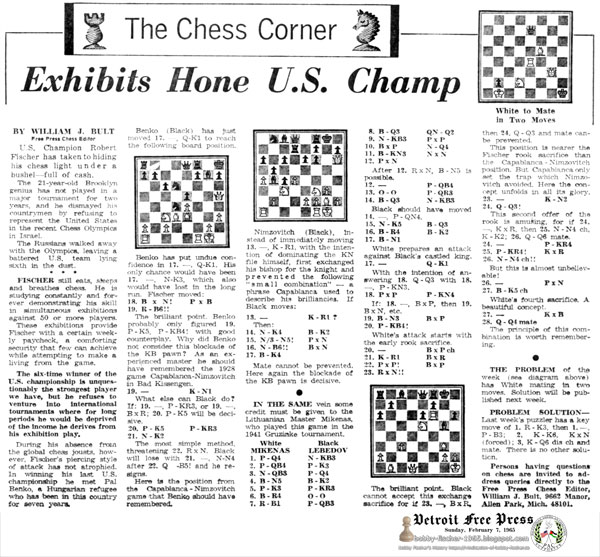Detroit Free Press Detroit, Michigan Sunday, February 07, 1965 - Page 32
Exhibits Hone U.S. Champ
U.S. Champion Robert Fischer has taken to hiding his chess light under a bushel-full of cash.
The 21-year-old Brooklyn genius has not played in a major tournament for two years, and he dismayed his countrymen by refusing to represent the United States in the recent Chess Olympics in Israel.
The Russians walked away with the Olympics, leaving a battered U.S. team lying sixth in the dust.
FISCHER still eats, sleeps and breathes chess. He is studying constantly and forever demonstrating his skill in simultaneous exhibitions against 50 or more players.
These exhibitions provide Fischer with a certain weekly paycheck, a comforting security that few can achieve while attempting to make a living from the game.
The six-time winner of the U.S. championship is unquestionably the strongest player we have, but he refuses to venture into international tournaments where for long periods he would be deprived of the income he derives from his exhibition play.
During his absence from the global chess jousts, however, Fischer's piercing style of attack has not atrophied. In winning his last U.S. championship he met Pal Benko, a Hungarian refugee who has been in this country for seven years.
Benko (Black) has just moved 17. — Q-K1 to reach the following board position.
Benko has put undue confidence in 17. —, Q-K1. His only chance would have been 17. —, N-K3, which also would have lost in the long run. Fischer moved:
18. B x N! P x B
19. R-B6!!
The brilliant point. Benko probably only figured 19. P-K5, P-KB4! with good counter play. Why did Benko not consider this blockade of the KB pawn? As an experienced master he should have remembered the 1928 game Capablanca-Nimzovitch in Bad Kissengen.
19. — K-N1
What else can Black do?
If: 19. —, P-KR3, or 19. —, BxR; 20. P-K5 will be decisive.
20. P-K5 P-KR3
21. N-K2
The most simple method, threatening 22. RxN. Black will lose with 21. —, N-N4 after 22. Q-B5! and he resigns.
Here is the position from the Capablanca-Nizmovitch game that Benko should have remembered.
Nimzovitch (Black), instead of immediately moving 13. —, K-R1, with the intention of dominating the KN file himself, first exchanged his bishop for the knight and prevented the following “small combination” - a phrase Capablanca used to describe his brilliancies. If Black moves:
13. — K-R1?
Then:
14. N-K4 B-K2
15. N/3 -N5! PxN
16. N-B6!! BxN
17. B-K4
Mate cannot be prevented. Here again the blockade of the KB pawn is decisive.
IN THE SAME vein some credit must be given to the Lithuanian Master Mikenas, who played this game in the 1941 Gruzinke tournament.
…
This position is nearer the Fischer rook sacrifice than the Capablanca - Nimzovitch position. But Capablanca only set the trap which Nimzovitch avoided. Here the concept unfolds in all its glory.
























